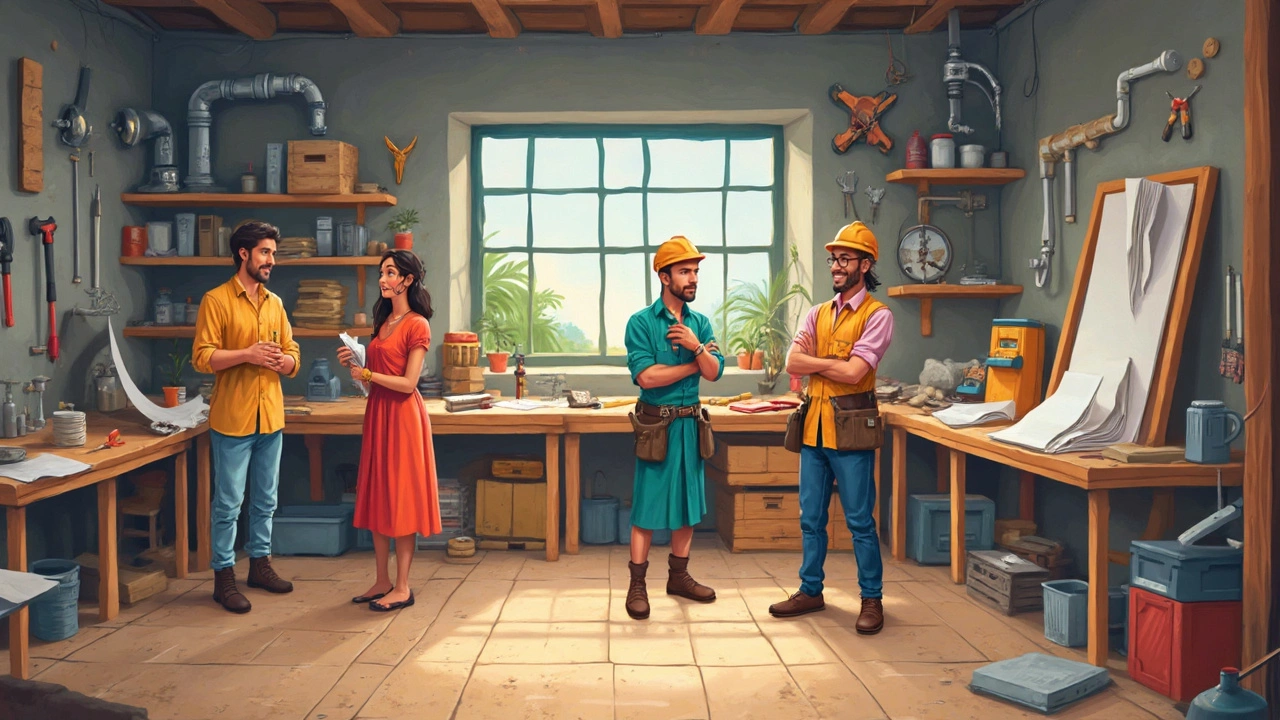Picking a trade in construction isn't just about swinging hammers or connecting wires—it's about finding a path that offers not only a paycheck but satisfaction and growth. Ever wondered why some folks seem to love their jobs way more than others? It often boils down to choosing the right trade.
For starters, let's talk about electricians. These folks don't just switch things on and off; they're the ones keeping everything wired and safe. In terms of demand and pay, electricians are often at the top of the list. If you don't mind a bit of crawling around in ceilings and tight spaces, this might be the gig for you.
Then we have plumbers, the real lifesavers when things go south with your pipes. It's a trade that promises job stability and the potential for some pretty hefty incomes. Plus, not every hero wears a cape; some carry a wrench.
- Why Your Trade Matters
- Electricians: Wiring Your Future
- Plumbers: Keeping It Flowing
- Carpenters: Building Dreams
- Bricklayers and Masons: Solid Foundations
- Making the Right Choice
Why Your Trade Matters
Choosing the right trade in construction jobs isn't something to rush through. It's kind of like picking the perfect pair of boots, you know? You want something that fits well, lasts long, and suits your style. In the construction world, your trade can define how your day-to-day looks, how much you take home, and even how happy you might be on a Monday morning.
First up, let’s talk about job stability. The world needs construction workers, no doubt about that. But some trades, like those super-needed electricians and plumbers, often have a more consistent demand. With cities growing and infrastructure aging, these roles are crucial.
Now, let's dive into the coin. Earning potential varies a ton in construction. Electricians and plumbers typically earn higher than average wages, especially if you’re in areas like London or Manchester where building never seems to stop.
But it’s not all about the money. Personal satisfaction should be high on the list when you're picking a trade. Are you a hands-on person? Do you get a kick out of fixing stuff? Maybe building something from scratch is more your scene? Trades like carpentry might be your thing if you love seeing your work take shape.
Oh, and don’t forget about career progression. Certain trades offer better opportunities for moving up, like starting your own business or becoming a contractor. The more skills you pick up, especially if they’re in high-demand areas, the more doors you'll find opening.
So, when pondering the best path in construction, think about what keeps you engaged, excited, and, let’s be real, what pays the bills. Choose wisely; this isn't just a job—it's a lifestyle.
Electricians: Wiring Your Future
Being an electrician is more than just dealing with circuits and wires. These skilled professionals are the backbone of modern-day infrastructure, ensuring that our homes, workplaces, and public spaces are lit, powered, and safe. If you're looking for a solid and rewarding career, this might be worth considering.
First off, why is the electrician trade so attractive? Well, demand is a big part of it. With the growing emphasis on renewable energy and smart homes, electricians are needed more than ever. Plus, as our reliance on electricity increases, these folks stand as guardians, maintaining and upgrading the systems we count on every day.
Money talks, right? Electricians often enjoy lucrative salaries. In the UK, starting salaries can range from £18,000 to £30,000 annually, but experienced professionals can earn £40,000 or more. That's not too shabby for having skills that are always in demand.
Construction jobs involving electrical work are reliable, with most electricians finding work throughout the year, come rain or shine. This is because, unlike some other trades, electrical work isn't usually seasonal. Need a lights fixed or new wiring? It's helpful year-round!
Training to become an electrician typically involves an apprenticeship. This path offers education and hands-on experience, which is crucial. Let's break it down:
- Education: You'll need GCSEs, usually including math and science.
- Apprenticeship: Combines on-the-job training with classroom learning, typically lasting 3-4 years.
- Certifications: You'll get qualifications like NVQs and possibly go for additional credentials for advanced skills.
Electricians also have the chance to continuously expand their toolkit. With technology advancing rapidly, there's always something new to learn, making it an exciting trade where you never feel stuck doing the same old thing. Plus, you can specialize in areas like renewable energy, allowing you to be at the forefront of future tech!
So, if you're not afraid of a little bit of sparking or working in tricky spaces, becoming an electrician might just be the best move you can make. Just think about it—wiring the future, one connection at a time.
Plumbers: Keeping It Flowing
Imagine a world without plumbers—it's chaos, right? These unsung heroes make sure our water systems keep flowing like a charm, stepping in when things go from drippy to downright messy. Opting to become a plumber isn't just a practical choice; it's a solid career move with plenty to offer in terms of stability and income.
One cool fact: did you know that plumbing dates back thousands of years to ancient civilizations like the Romans and their iconic aqueducts? They laid the groundwork (pun intended) for what is now a construction industry staple. In modern times, plumbers are branching into areas like green technology, water conservation, and smart home installations. Kind of exciting to think about how much this trade is evolving!
As for demand, the job outlook for plumbers is generally strong. With urbanization picking up and an increasing focus on efficient water use, skilled plumbers are always in need. Plus, there's a wide range of specializations you could consider, from residential jobs to huge commercial projects.
If you're wondering about earning potential, here's a quick peek: in the UK, plumbers can earn anywhere from £20,000 to over £40,000 annually, depending on experience and location. Of course, starting your own plumbing business could bump those figures up significantly.
Let's break down the perks of taking on this trade in the construction industry:
- Job Security: It's recession-proof. No matter the economic climate, water systems need attention.
- Income: Competitive salaries with room for growth, especially if you specialize or start a business.
- Flexibility: Choose to work for a company or strike out on your own.
- Skill Variety: From fixing small leaks to installing cutting-edge systems, no two days are the same.
So, if you're not afraid to get your hands wet, embarking on a plumbing career might just be your ticket to a stable and rewarding future in construction jobs.

Carpenters: Building Dreams
Carpentry is like the backbone of the construction world. If you've ever admired a well-crafted staircase or a customized wooden deck, you've witnessed the magic carpenters bring to life. They are the artists of the construction site, responsible for turning raw materials into functional and beautiful pieces that shape our living and working spaces.
So, why might you choose carpentry? Well, for starters, this trade offers a fantastic mix of creativity and practicality. You're not just cutting wood; you're designing and building structures that will stand the test of time, and there's something incredibly satisfying about that.
In terms of opportunities and stability, carpentry is right up there with other key trades. The demand for skilled construction jobs in carpentry continues to grow, particularly in areas like home renovation and commercial building projects. Plus, if you're thinking about going self-employed, carpentry offers plenty of room for running your own show.
One of the best things about being a carpenter is the variety in tasks each day. One moment, you might be framing a house; the next, you're installing kitchen cabinets. This variety means the job never gets dull, keeping motivation high.
Here's a quick snapshot of what the journey to becoming a successful carpenter could look like:
- Getting a solid education and hands-on training through apprenticeships or trade school.
- Mastering essential skills like reading blueprints, using hand and power tools, and understanding building codes.
- Building experience in different areas like rough carpentry, finish carpentry, or residential vs. commercial projects.
In the UK and beyond, carpenters often enjoy good job security and competitive wages. As of recent data, the average salary for a carpenter in the UK hovers around £29,000 per year, with the potential to earn more as you gain experience and specialize.
All in all, if you love working with your hands, have an eye for detail, and want a career that combines creativity with functionality, carpentry might just be the perfect trade for you in the bustling world of construction jobs.
Bricklayers and Masons: Solid Foundations
If you've ever walked by an impressive building and admired its charm, chances are, bricklayers and masons had a big hand in creating it. These folks are the backbone of the construction industry, quite literally laying the groundwork essential for everything above it to stand tall and strong.
Unlike some trades that hit their stride in bursts, bricklayers and masons enjoy consistent work thanks to the constant demand for durable and sustainable building methods. Construction jobs within this skill set are pretty stable since bricks and mortar are never going out of style.
The craft of bricklaying isn't just about stacking bricks. It's a skill that requires precision and a keen eye for design, blending both structural integrity and aesthetics. With training, you could make brick arches that not only support roofs but look pretty cool too.
One interesting perk about becoming a bricklayer is the potential to showcase your work for years to come. The durability of your projects might mean that future generations will see your craftsmanship. If leaving a lasting mark is important to you, this trade is right up your alley.
Moreover, if you love working outdoors, this job offers that in spades. You’ll be out in the open air, getting your hands dirty while developing a lifelong skill. Plus, physical activity keeps you fit, which beats being stuck behind a desk any day!
Here's a quick look at the earning potential for bricklayers:
| Experience Level | Average Annual Salary (£) |
|---|---|
| Entry-Level | 20,000 - 25,000 |
| Mid-Level | 25,000 - 35,000 |
| Experienced | 35,000 - 50,000+ |
So, if creating solid structures sounds fulfilling to you, think about a future in bricklaying or masonry. It's all about building not just structures but reliable careers in the construction industry.
Making the Right Choice
When it comes to picking the best trade in construction jobs, you need to think about a few key things. First up, what's your passion? Love drawing and design? Carpentry could be your thing. Got a knack for fixing complicated systems? Then becoming an electrician might be a perfect fit.
Then there's the whole money side of things. Trades like plumbing and electrical work tend to offer higher pay rates. According to 2024 data, electricians in the UK earned an average annual salary of £34,000, while plumbers brought home about £32,000. These are just averages, of course, and your mileage may vary depending on skill level and location.
Consider job stability as well. The construction industry is booming, and there's high demand for skilled workers like carpenters and bricklayers. A skilled brickie can pretty much guarantee regular work since there’s always something new being built or old being fixed.
Don't overlook the importance of personal satisfaction. It's not all about the paycheck. A trade that aligns with your interests and goals will make going to work each day a whole lot more enjoyable.
Finally, think about the future. The construction industry is shifting towards sustainability and green technologies. If you're into new tech or saving the planet, trades like solar panel installation or energy-efficient engineering could be exciting options. The point is, the best trade is one that fits who you are and where you want to go.
Here's a quick comparison to give you a clearer picture:
| Trade | Average Salary | Job Stability |
|---|---|---|
| Electrician | £34,000 | High |
| Plumber | £32,000 | High |
| Carpenter | £28,500 | Moderate |
| Bricklayer | £31,000 | High |






